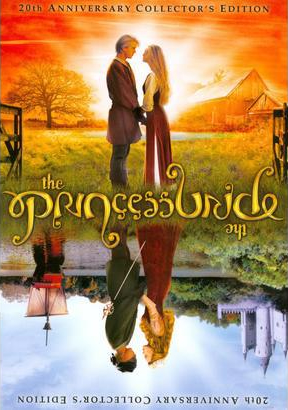Speculative Faith Movie Missions: Intro
Welcome! Today marks the first day of the Speculative Faith Reading Group’s reboot.1
So far we’ve enjoyed going through classic fantasies such as The Lion, the Witch and the Wardrobe and The Hobbit. In doing this we have assumed a few things: that reading a story is not only a personal pursuit, but an act of worship. It’s something we can enjoy together.
Now we’re moving beyond reading and into film-viewing, for several reasons:
 The first is a sentence like this, from a Christian review of The Hobbit: An Unexpected Journey. “Soon after Gandalf comes to Bilbo, 13 dwarves show up, a biblical number.” If we don’t understand movie-watching Biblically, we’ll lapse into silliness like that.
The first is a sentence like this, from a Christian review of The Hobbit: An Unexpected Journey. “Soon after Gandalf comes to Bilbo, 13 dwarves show up, a biblical number.” If we don’t understand movie-watching Biblically, we’ll lapse into silliness like that.- Second, Christian movie reviews often “focus on the family.” They assume we already know how to watch and enjoy movies as individual Christian adults and as the church.
- Third, Christians have lingering assumptions about why we “use” stories in films.
What are those assumptions? Without intent to alliterate, they all start with the letter E:
1. Entertainment
I watch this movie or put it on for my kids because “it’s just a movie,” and (especially if it’s rated G) little in it is harmful. Nothing is wrong with entertainment for us either, and if we can enjoy the movie without doing anything wrong, suggesting otherwise may be legalism.
2. Edification
I watch this movie or put it on for my kids because it teaches one or more moral values. (Some Christian DVDs endorse this by putting “A Lesson in [X]” right on the cover.) When I or my kids are enjoying a movie, we want it to be for the purpose of having Christian behavior reinforced.
3. Evangelism
Movies can be entertaining or edifying, but the best movies include a direct Gospel message. Because we should preach the Gospel, a movie like this may be the most “Christian” kind of movie. Bonus if the entire “way of the master” Gospel is presented, with a call for repentance.
So what’s wrong with these?
Nothing. Stories in films should certainly be entertaining, edifying, and even evangelistic. (All stories have messages to preach, no matter how much their artists claim otherwise.)
But we may miss out on God’s joys if they expect stories in movies only to be this way.
Here we must look not to traditions, but to the commands and example of God’s Story and the many ways in which our Author told His Story (including with fiction!) in His Word.
Two Biblical “genres” alone confirm that good stories are about more than these three Es:
- The Psalms are well-written and entertaining, but for the point of extolling God’s greatness, man’s love for Him and struggles with evil (or Him!), and the goodness or badness of the world. Jesus’s parables are entertaining, but mainly for the points of showing what His Kingdom is like, or what God is like, or even what Hell is like.
- The Psalms are morally edifying, such as when they extol the wonders of God’s Law, but they are also challenging — such as when the Psalmists pour out their doubts about God, or seem to endorse thoughts of their enemies (and God’s enemies) being punished. Jesus’s parables are also edifying, such as when He talks about good behavior (e.g., the Good Samaritan). Yet He also uses examples of bad behavior (e.g., the shrewd manager).
- The Psalms may be “evangelistic” because God is always at their center. But they often show only parts of His character at a time, and for other purposes assume Who He is and what He does, rather than repeating all these truths. Jesus’s parables similarly, and stubbornly, hide the whole truth about Him from all but the most dedicated seekers.
Why then should Christians enjoy stories and movies?
Based on the same reason God created man to do anything, as the confession says:
Man’s chief end is to glorify God, and to enjoy Him forever.
 … We might reword the definition to be about art, stories, movies, or any Thing:
… We might reword the definition to be about art, stories, movies, or any Thing:
Story’s chief end is to help us glorify God, and to enjoy Him forever.
We might flesh this out: With a story we can explore and enjoy the beauty, goodness, and truth of God, people, and His world.
Now for The Princess Bride.2 As you enjoy this comedy/fantasy film, consider: what beauty, goodness, and truth about God, people, and His world do we find? And even if part of the story does not align with God’s Story, how can we appreciate the good parts by contrast?
- These are my introductory notes for a first real-life movie group at my church, for all ages, opening with viewing and discussion of The Princess Bride. ↩
- Part 2 in the Speculative Faith Movie Missions series should arrive next week. ↩






























That’s not a particularly inspired review, but I don’t think we should never look for significance or draw connections that way. I see what you mean. The fact that 13 might be a “biblical number” is irrelevant. (In fact, I don’t think the number 13 is extremely relevant in interpreting the Bible, either. ;)) But sometimes connections that we might make may be relevant, even if the author might not have intended them. If they are visible to us, they affect our interpretation and enjoyment of the story.
Agreed that in general, numeric connections may be intentional or unintentional Biblical tributes/echoes/ripoffs. But yes, I recall little significant about the number “13,” and even if there were, do we really mean that makes The Hobbit even more of a Christian story (yay! it’s a Christian story!) than it already was?
If I recall correctly, the number thirteen is considered unlucky by Thorin & Co., which superstition serves as one of their primary motivations for assenting to Gandalf’s nomination of Bilbo as company burglar. Hard to see how that source of significance meshes with the whole “biblical symbology” interpretation.
Yes. And notice how the review unfortunately says “a Biblical number” and then moves on. Doesn’t even try to make numerological associations that could have sounded really, really profound, even with minimal effort.
E.g.: “Look, 13 is 6, the number of man, plus 7, the number of God, which is a clear connection between the Dwarves’ origin as described in The Silmarillion, when one of the Valar also wanted to create something living (like men) and please Ilúvatar (like God).”
Well, I’ve decided that all works of fiction are testimonial, pointing to Christ. How can one write the hero’s journey over and over again without realizing what you’re doing? Or romance genre tropes?
Pagan authors who do realize this are careful to consciously deconstruct their work (anything by Gaiman or Grossman). But even their wicked characters in their wickedness point to God. Doesn’t the pessimism of Martin reflect the inability and sinfullness of man and the need for a savior?
One word of caution though. It seems problematic to draw analogies between God breathed scripture and our human efforts in terms of what certain Scriptures are trying to accomplish versus what we are trying to do.
Then again I’ve been fascinated by the theory re. the book of Job as a work of fiction, an ancient story that God put his impremature upon.
Forgive the grammar. I’m on my phone…
The Princess Bride does show how ridiculous “twu luv” can be sometimes.
So glad to have found you! I so hate wading through fantasy, sci fi and fiction that is offensive to my faith. What a good source.
[…] the Speculative Faith Movie Missions series introduction, posted a long time ago in a galaxy far […]